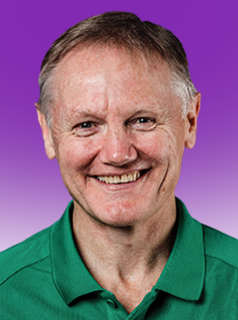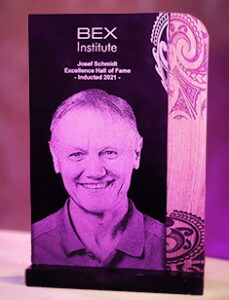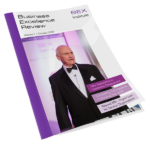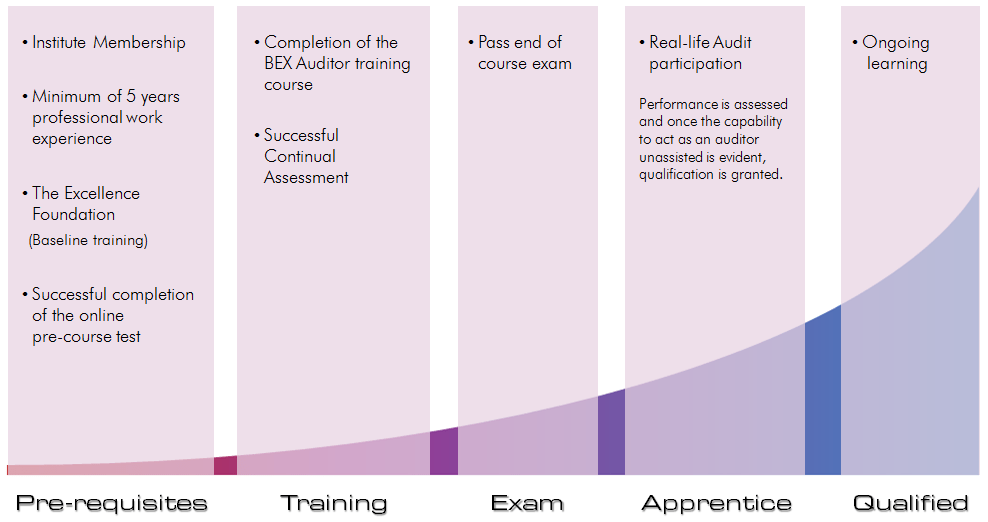Excellence Hall of Fame – Josef Schmidt

Nominated by: JP Donnelly
Seconded by: Phil Guerin and John Bourke

Bio
Joe is World Rugby’s Director of Rugby and High Performance and former head coach of both the Irish rugby team and of Leinster Rugby.
Born almost as far north in New Zealand as one can go, Joe’s family had moved south twice by the time he was 7 and he grew up the third child of eight, in the town of Woodville, just over 2 hours north of Wellington. Having completed secondary school aged 16, inspired by the passion of one of his former teachers, Joe wanted to apply to teacher training college but he was too young. Instead, he took a job working in a nearby branch of the Bank of New Zealand.
In 1983, Joe left the bank and enrolled in teacher training college where he met his future wife, Kelly. He qualified as a teacher in 1986. The following year, he earned his Bachelor’s in Education from Massey University. After two years of intermediate school teaching, he took a job teaching English at Palmerstown North Boys’ High School in 1990, where he coached basketball, rugby, and cricket. While there, he played rugby both for the school’s Old Boys Club and for the provincial team, Manawatu. Joe and Kelly got married in 1990 and decided to go traveling before settling down. They had planned to take teaching jobs in the UK but got side-tracked by a rugby-coaching opportunity in the provincial town of Mullingar in Ireland. They had thought to stay for one season but enjoyed themselves so much that they stayed for almost a year and a half, during which time Joe also taught part-time at a number of different schools.
He returned to Palmerston North Boys’ High School in 1993 and in 1997, Joe became a (voluntary) NZ Schools’ rugby assistant coach. In July 1998, he moved to Napier Boys’ High School as Assistant Principal and then, in 2000, he moved to Tauranga Boys’ College to become its Deputy Principal. While there, he also undertook a Diploma in Sports Management (as an extension of the coaching practicum which people coaching national underaged teams were required to do). Being responsible for the day to day running of a school with over 1600 students, it was useful to have an understanding of management theory and practice so, in 2002, Joe arranged study leave to complete a Masters in Management. Soon after organising the study leave, he was asked to help Vern Cotter coach the National Provincial Championship team, Bay of Plenty (the “Steamers”). This was ultimately to change his career.
In 2004, with his Masters behind him, Joe established a Rugby Academy for the Steamers and also helped the Steamers win the “Ranfurly Shield” (New Zealand’s oldest rugby trophy, which is won by challenging and defeating the holders) for the first time in their 100 year history. Shortly afterwards, Joe parted ways with the Steamers to focus exclusively on the more challenging job of international club rugby with the (Auckland) Blues.
Joe served as assistant coach to the Blues until the end of the 2007 season (in which it reached the Super Rugby semi-finals), after which he took the opportunity to reunite with Vern Cotter and take on the challenge of learning French as the backs coach for Clermont Auvergne. While Joe was with Clermont, the side was runner-up in the French Top 14 twice and then, in 2010, won the competition for the first time, in its tenth final and after 100 years of trying.
At the end of the 2009/2010 season, Joe and Kelly left Clermont to return to Ireland with their four children, where he took over as Head Coach of Leinster Rugby. In his first year with Leinster, the team made it to the finals of the Celtic League (called the “Pro14” since the addition of South African clubs) and won the European Champions (Heineken) Cup with the greatest comeback to date in a European Cup final (they had been behind at half-time, 22-6).
The following year, under his leadership, Leinster won the Heineken Cup again (making them the second team ever to retain it and the first team to win it unbeaten in the season). They once again made the finals of the Celtic League and were only defeated by a last-minute score. In 2013, Leinster won the Celtic League and, having been knocked out of the Heineken Cup by Clermont, they won the European Challenge Cup. At the end of the season, Joe took over as head coach of the Irish men’s rugby team, having led Leinster to four trophies and victory in 77 of the 99 competitive matches they played during his tenure.
He led Ireland (who were ranked 9th in the world) into the 2013 “Autumn Internationals,” clocking up a win against Samoa and a loss to Australia, before facing the world number-one, New Zealand, and establishing a 19-0 lead, only to lose the match by 2 points in the final minutes of the game. In March the following year, Ireland won the Six Nations (the northern hemisphere’s international championships). This was quickly followed by Ireland’s first ever series win against Argentina in Argentina and, in November, by victories over South Africa, Georgia, and Australia which moved Ireland into third place in the World Rugby Rankings. In December 2014, Joe received the RTÉ Sports Manager of the Year Award from Ireland’s national broadcaster and was named Philips Sports Manager of the Year by, the Dutch Company, Philips.
He quickly gained an international reputation for being analytical, demanding of both himself and the team, and for being deeply committed, even injuring himself a couple of times (including a torn hamstring) during Ireland’s training sessions. Believing that one needs to grow one’s people and not just their skills, Joe periodically got the team involved in charity work, helping, for example, the homeless and the elderly. He also nurtured shared leadership and teamwork within the Irish camp while growing the squad’s depth as well as himself, by studying leadership, psychology, and – through books like Taleb’s Fooled By Randomness – probability and chance.
In 2015, Ireland won the Six Nations again having lost only one of their five matches in the competition and in September, just before his 50th birthday, Joe became an Irish Citizen.
In June 2016, Joe led Ireland to its first ever away win over South Africa. This was followed in November by Ireland’s first victory after a 111 year wait over New Zealand with a 40-29 win over the All Blacks in Chicago. A few weeks later, Ireland defeated Australia 27-24 to achieve a rare “triple-win” over Australia, New Zealand, and South Africa in a single year.
In the 2017 Six Nations, Ireland ended England’s 18-match winning streak. The following year, it again won the Six Nations Championships with a “Grand Slam” victory by defeating all its opponents, before winning a series of away matches against Australia for the first time in almost 40 years. Then, in November 2018, Ireland faced New Zealand and defeated them for the second time in history. Joe was named World Rugby Coach of the Year. Also in 2018, he was awarded an Honorary Fellowship of the Royal College of Physicians of Ireland, Faculty of Paediatrics, in recognition of the significant contribution he has made to children’s health and wellbeing and for his advocacy work for epilepsy services.
In 2019, he won the Guinness Rugby Writers’ Tom Rooney award in recognition of “his immense contribution to Irish rugby” and he was awarded an honorary doctorate by Dublin City University. In the same year, ahead of the World Cup, Ireland’s performance earned it first place in the World Rugby Rankings for the first time ever. In the World Cup, Ireland came second in its pool (having been defeated by an impressive performance by the hosts, Japan) and went out to New Zealand in the quarter finals. Afterwards, Joe retired from coaching as planned, having led Ireland to victory in 53 of 73 matches. His impact on Irish rugby and on how the team sees itself, will be very long lasting (as evidenced by the ongoing success of Leinster after his departure).
His autobiography, Ordinary Joe (which he wrote without a ghost writer), was published in November 2019. Its title reflects his humility but also his belief that any “ordinary person,” who adopts a growth mindset and applies themselves, especially if striving to create value for others, can accomplish great things.
In October 2020, Joe took on a new role in World Rugby as its Director of Rugby and High Performance. In this role he has responsibility for education, training, match officials, and player welfare. In the press release announcing his appointment, World Rugby referred to him as “one of the most successful and widely respected high-performance head coaches of his generation.”
He has been nominated for induction to the Excellence Hall of Fame in recognition of his unfaltering pursuit of excellence, the impact he has had on the people and teams he has coached, his contribution to the sport of rugby and, through that, to societies around the world.















